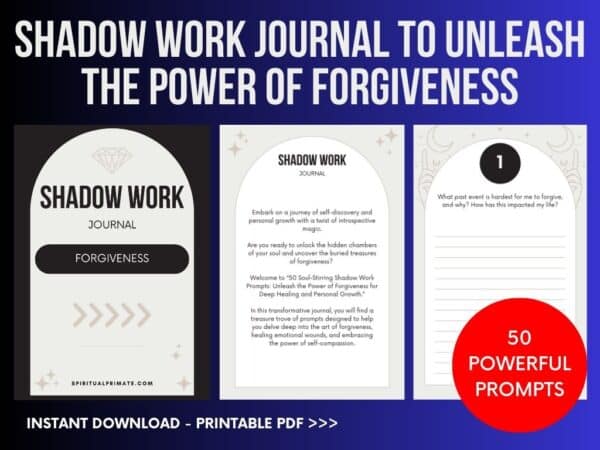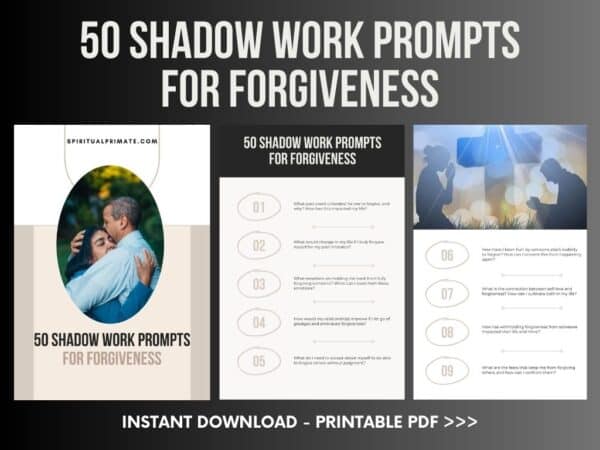Embark on a journey of self-discovery and personal growth with a twist of introspective magic. Are you ready to unlock the hidden chambers of your soul and uncover the buried treasures of forgiveness? Welcome to “50 Soul-Stirring Shadow Work Prompts: Unleash the Power of Forgiveness for Deep Healing and Personal Growth.”
In this transformative guide, you will find a treasure trove of prompts designed to help you delve deep into the art of forgiveness, healing emotional wounds, and embracing the power of self-compassion.
By exploring these prompts, you will not only discover the strength within yourself to forgive, but also ignite a newfound sense of inner peace and wholeness. Are you prepared to embark on this life-changing expedition into the depths of your own heart?

The Power of Forgiveness
Forgiveness is the act of letting go of resentment, anger, or blame toward someone who has caused you harm or hurt your feelings. It is a conscious decision to release negative emotions and thoughts, allowing you to move forward with a sense of peace and understanding.
In essence, forgiveness is not about forgetting the harm done to you or excusing the offender’s actions. Rather, it is a process of personal growth and healing that enables you to free yourself from the burden of hurt and bitterness. By practicing forgiveness, you take control of your own emotional well-being, paving the way for healthier relationships and a more positive outlook on life.
Forgiveness is not always easy, but it is essential for both mental and emotional health. It can help you overcome feelings of anger, resentment, and the desire for revenge. In doing so, you can experience a sense of relief and inner peace, allowing you to focus on the present and build a brighter future. Remember, forgiveness is a gift you give yourself, not just the person who hurt you. So, embrace the power of forgiveness and experience the positive change it can bring to your life and the lives of others.

Shadow Work and the Path to Forgiveness
Shadow work is a psychological practice that involves delving into the hidden aspects of our unconscious mind, also known as our “shadow self.” This process of self-discovery can help us recognize and integrate the unacknowledged and repressed emotions, traits, and desires that we may have buried deep within ourselves. By confronting and understanding these aspects, we can achieve personal growth, healing, and ultimately, forgiveness. In this article, we’ll explore how shadow work can facilitate the process of forgiveness and lead to a more balanced and harmonious life.
Understanding the Shadow Self
The concept of the shadow self was introduced by renowned Swiss psychiatrist and psychoanalyst Carl Jung. According to Jung, our shadow self consists of those parts of our personality that we’ve repressed or disowned due to societal norms, personal beliefs, or the fear of being judged. These can include negative emotions such as anger, jealousy, resentment, and guilt.
When we ignore or deny these aspects of ourselves, they can manifest in unhealthy and destructive ways, sabotaging our relationships and emotional well-being. Shadow work encourages us to confront and accept these hidden parts of ourselves so we can integrate them into our conscious mind and use them productively.
The Connection Between Shadow Work and Forgiveness
Forgiveness is the act of letting go of negative emotions towards someone who has caused harm or hurt feelings. It is essential for mental and emotional health, as holding onto anger and resentment can create a toxic cycle of bitterness and pain.
Shadow work can help facilitate forgiveness by allowing us to recognize and understand the hidden emotions and motivations that influence our reactions to others. By becoming aware of these underlying factors, we can develop empathy for ourselves and others, making it easier to let go of resentment and forgive.
Steps to Incorporate Shadow Work in the Forgiveness Process
1. Self-awareness: Begin by identifying any negative emotions you’re holding onto, like anger, resentment, or guilt. Be honest with yourself about the reasons behind these feelings and try to understand the role your shadow self may have played in their development.
2. Acceptance: Acknowledge and accept these emotions as valid parts of yourself. Understand that they serve a purpose, even if it’s not immediately apparent. By accepting your shadow, you can start to integrate it into your conscious mind and work towards a more balanced and harmonious perspective.
3. Empathy: Develop empathy for yourself and others by recognizing that everyone has a shadow self, and we are all dealing with our repressed emotions and desires. This understanding can help you see the humanity in others, even when they’ve caused you pain.
4. Healing: Begin the healing process by forgiving yourself for any past actions or emotions that may have stemmed from your shadow self. Recognize that you are a work in progress and that it’s essential to continue exploring and integrating your shadow to grow and evolve.
5. Forgiveness: With a greater understanding of yourself and others, you can start to let go of any resentment and anger you’ve been holding onto. Forgiveness is an ongoing process, and it may take time, but through shadow work, you’ll be better equipped to heal and move forward.
Shadow work is a powerful tool for personal growth and healing. By confronting and understanding the hidden aspects of our unconscious mind, we can develop greater self-awareness, empathy, and ultimately, forgiveness. As we learn to accept and integrate our shadow selves, we become more balanced and whole, allowing us to let go of negative emotions and move towards a healthier, more harmonious life.

Shadow Work Prompts for Forgiveness
1. What past event is hardest for me to forgive, and why? How has this impacted my life?
2. What would change in my life if I truly forgave myself for my past mistakes?
3. What emotions are holding me back from fully forgiving someone? What can I learn from these emotions?
4. How would my relationships improve if I let go of grudges and embraced forgiveness?
5. What do I need to accept about myself to be able to forgive others without judgment?
6. How have I been hurt by someone else’s inability to forgive? How can I prevent this from happening again?
7. What is the connection between self-love and forgiveness? How can I cultivate both in my life?
8. How has withholding forgiveness from someone impacted their life and mine?
9. What are the fears that keep me from forgiving others, and how can I confront them?
10. What are the benefits of forgiveness? How can I remind myself of these when I struggle to forgive?
11. How can I use my past experiences of forgiveness as motivation to forgive again?
12. What does forgiveness look like in my daily life? How can I practice it more consistently?
13. How can I show empathy and understanding when working through forgiveness with others?
14. What role does my ego play in my ability to forgive? How can I let go of pride and embrace vulnerability?
15. In what ways do I need to forgive myself for not meeting my own expectations?
16. How can I practice self-compassion when I struggle to forgive my past actions?
17. What can I learn from the people I find hardest to forgive?
18. How can I use visualization techniques to help me forgive and let go of painful memories?
19. How has holding onto resentment impacted my mental and physical health? What steps can I take towards forgiveness for my well-being?
20. How can I rewrite my personal narrative to include forgiveness and healing?
21. What do I need to release to fully embrace forgiveness in my life?
22. How can I cultivate a mindset of forgiveness in my relationships and interactions with others?
23. How can I forgive myself for not being perfect? What does self-acceptance look like in this context?
24. How can I use journaling as a tool for forgiveness and self-reflection?
25. How can I have a conversation with someone I am struggling to forgive? What might I say to foster understanding and healing?
26. What are the boundaries I need to set in order to practice forgiveness without compromising my well-being?
27. How can I use meditation to help me find forgiveness and inner peace?
28. In what ways do I need to forgive my childhood self for not knowing better?
29. How can I practice forgiveness in the face of injustice or unfairness?
30. How can I find forgiveness for those who have caused me pain without excusing their actions?
31. What are the lessons I can learn from the process of forgiveness?
32. How can I create a ritual or practice to help me forgive and heal on a deeper level?
33. How has my perception of forgiveness changed over time? What has influenced these changes?
34. What role does spirituality play in my journey towards forgiveness?
35. How can I use creativity as a tool for healing and forgiveness?
36. How can I use the power of gratitude to help me forgive and move forward?
37. How can I set intentions for forgiveness, and what steps can I take to achieve them?
38. How can I use affirmations to help me embrace forgiveness in my life?
39. How can I find common ground with someone I am struggling to forgive?
40. How can practicing forgiveness help me find closure and healing after a loss or trauma?
41. What are the obstacles I face in my journey towards forgiveness, and how can I overcome them?
42. How can I use nature and the outdoors as a source of inspiration for forgiveness?
43. How can I forgive others for not understanding my pain or struggle?
44. What are the small, everyday acts of forgiveness I can practice to cultivate a forgiving mindset?
45. How can I use music or art as a form of expression and forgiveness?
46. How can I find strength in vulnerability when seeking forgiveness from others?
47. In what ways do I need to forgive society or the world for its shortcomings?
48. How can I use forgiveness as a tool for personal growth and transformation?
49. How can I practice radical empathy towards those I struggle to forgive?
50. How can I celebrate the progress I’ve made in my journey towards forgiveness, and use that energy to continue forward?
As we bring this life-changing journey to a close, we hope that each soul-stirring prompt has illuminated the path towards forgiveness, healing, and personal growth.
The power of forgiveness is not only a gift to ourselves but also a gift we can share with the world. As you continue to practice these exercises, remember that true healing is a process, and self-compassion is the key to unlocking the door to your highest potential.
And now, as you step forth from this transformative adventure, we leave you with one final question: How will you harness the power of forgiveness to bring about a lasting, positive change in your life and the lives of those around you?
Dive Deeper Into Your Shadow Work Journey
- Product on sale
 Printable Shadow Work Journal to Unleash the Power of Forgiveness for Personal Growth [PDF]Original price was: $11.98.$5.99Current price is: $5.99.
Printable Shadow Work Journal to Unleash the Power of Forgiveness for Personal Growth [PDF]Original price was: $11.98.$5.99Current price is: $5.99. - Product on sale
 50 Shadow Work Prompts for Forgiveness | Printable PDFOriginal price was: $5.98.$2.99Current price is: $2.99.
50 Shadow Work Prompts for Forgiveness | Printable PDFOriginal price was: $5.98.$2.99Current price is: $2.99.

